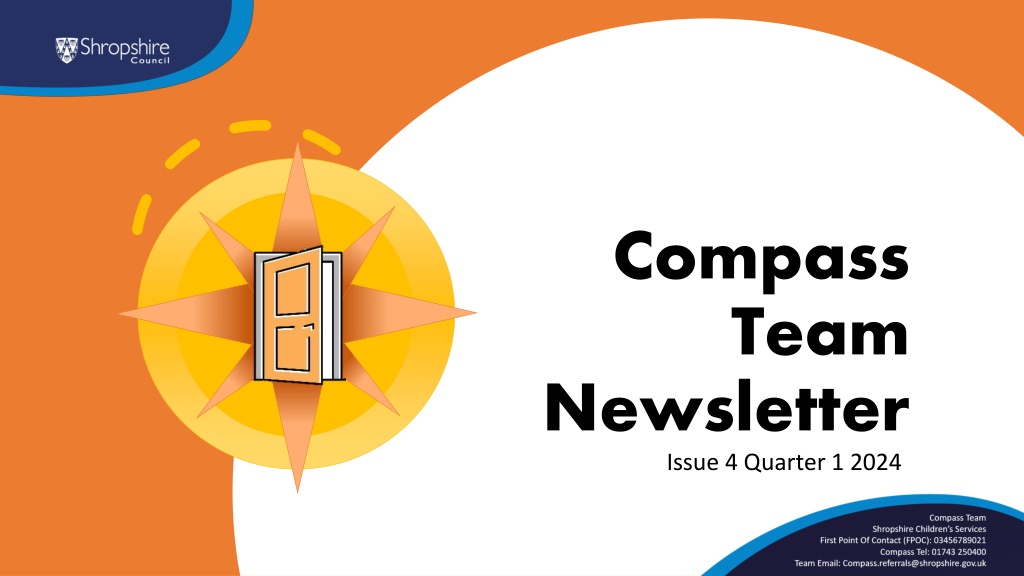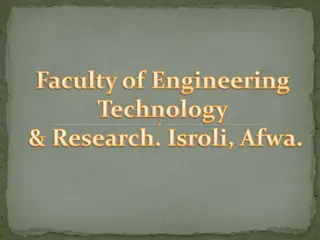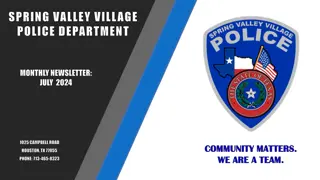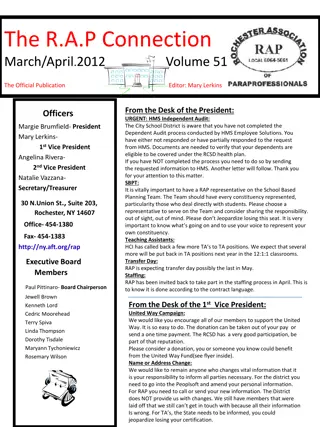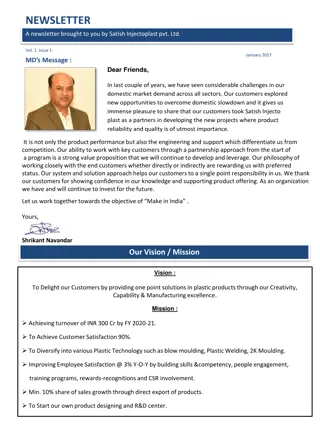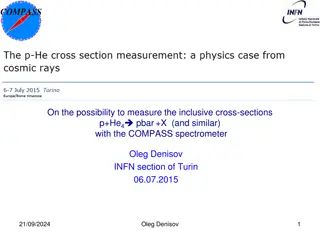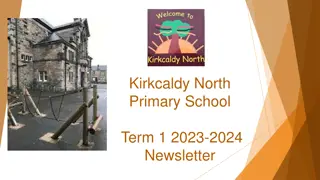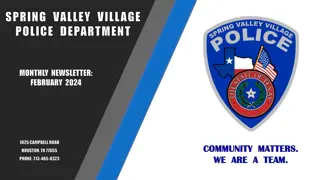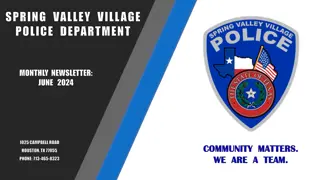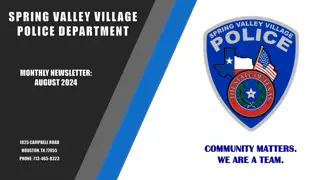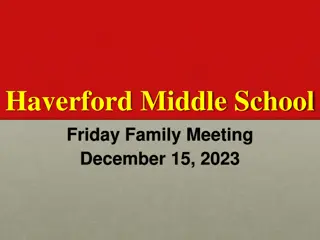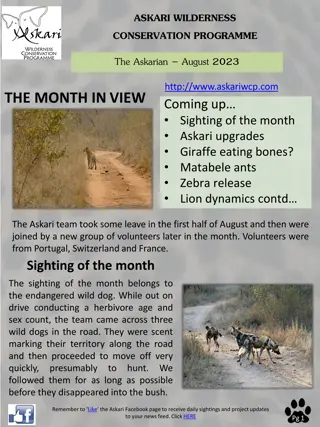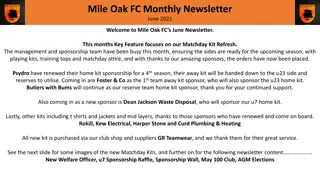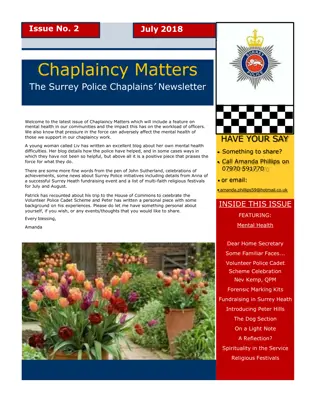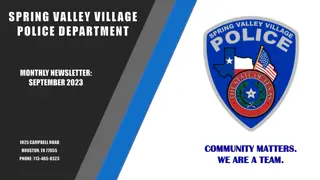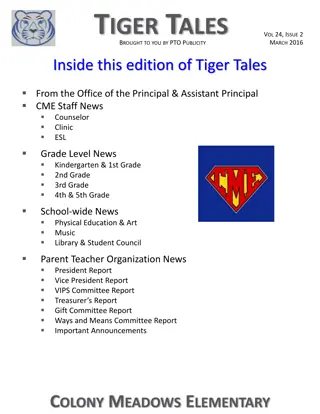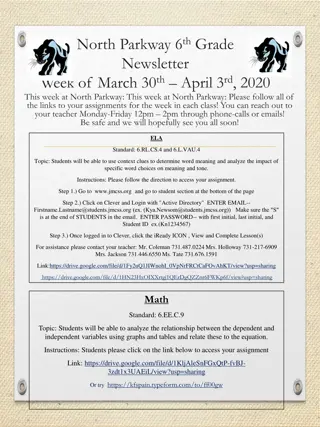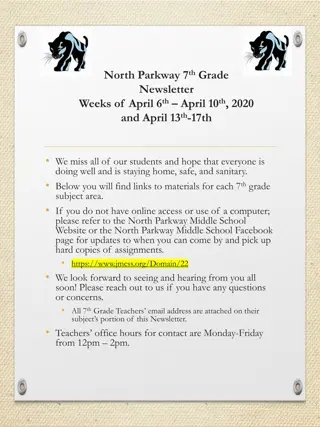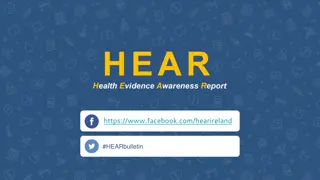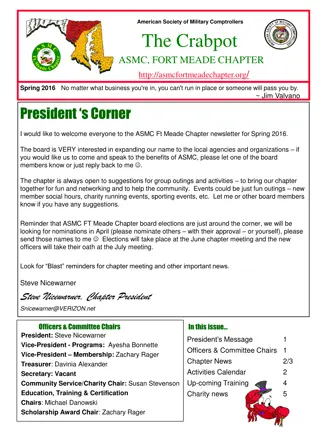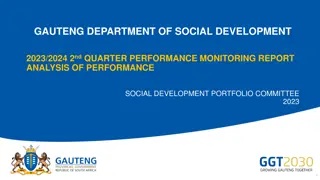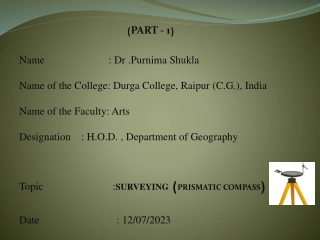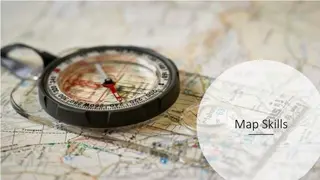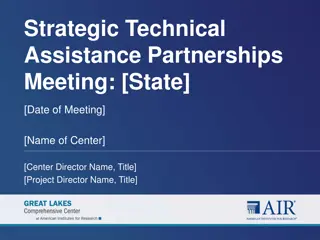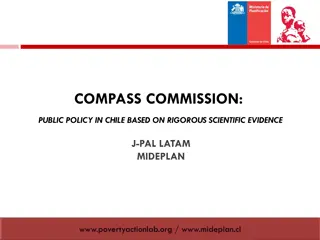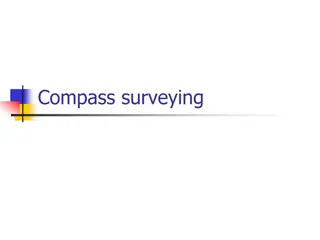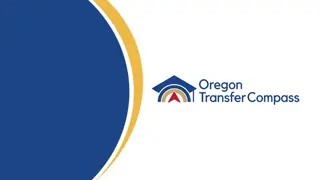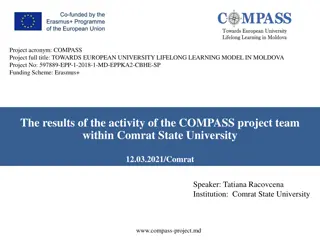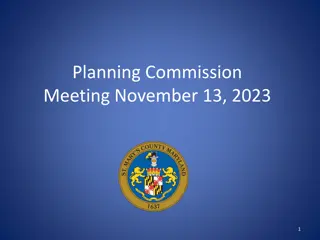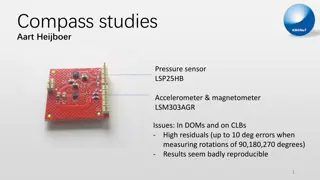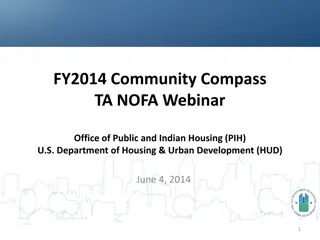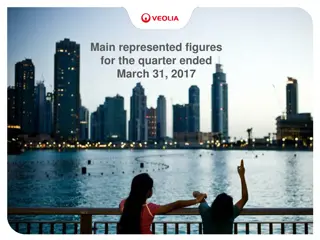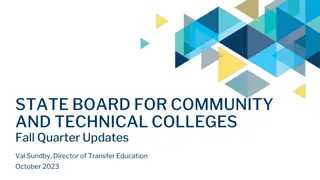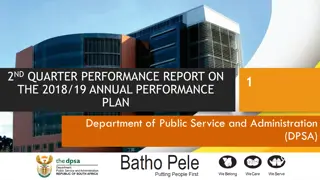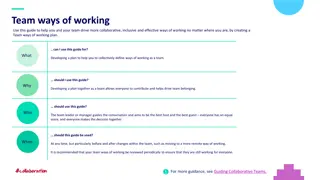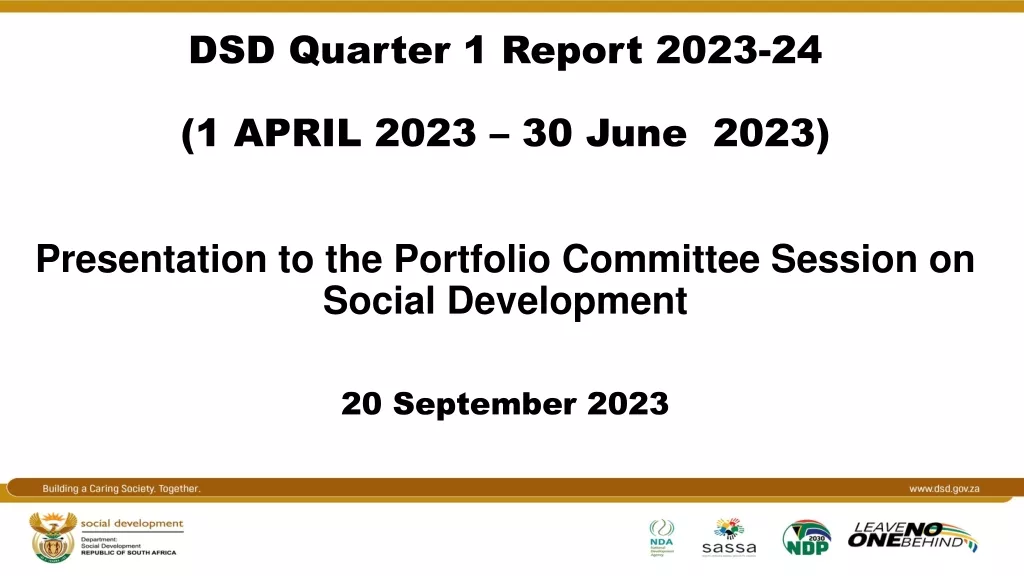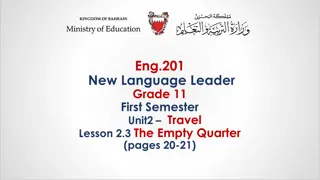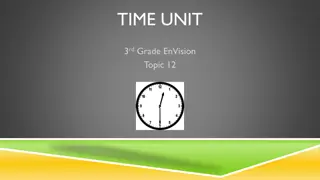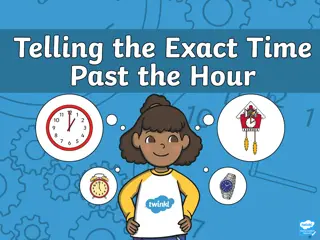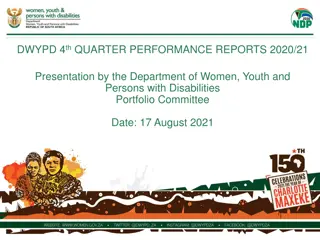Insights from Quarter 1, 2024: Compass Team Newsletter
The Fourth edition of the COMPASS newsletter provides valuable insights into data from Quarter 1 of 2024, focusing on contact breakdowns, vulnerability levels, referral sources, and outcomes of Strategy Meetings. Family Dysfunction, Neglect, and Domestic Abuse remain top concerns, with Section 47 Enquiries dominating Strategy Meeting outcomes. Explore the full report for a comprehensive overview of the work completed by the COMPASS team.
Download Presentation

Please find below an Image/Link to download the presentation.
The content on the website is provided AS IS for your information and personal use only. It may not be sold, licensed, or shared on other websites without obtaining consent from the author. Download presentation by click this link. If you encounter any issues during the download, it is possible that the publisher has removed the file from their server.
E N D
Presentation Transcript
Compass Team Newsletter Issue 4 Quarter 1 2024
Welcome! A warm welcome to all our partner agencies to our Fourth edition of the COMPASS newsletter. We hope that the information contained in this newsletter is both informative and useful and will give you an overview of the work we are completing in COMPASS. This Newsletter will focus on data obtained from Quarter 4 (January March 2024) Gemma Onions & Kate Owen (COMPASS Team Managers)
Themes of the Quarter Data taken from Q1 2024 January, February, March Total Contacts by Compass Workers of which outcome 'Progress to Children's Social Care' Vulnerability Level Breakdown Q4 400 324 320 303 904 904 1000 881 255 300 235 211 204 204 203 800 164 200 145 121 600 100 400 154 17% 138 15% 115 13% 0 JAN FEB MAR 200 0 Level 1 - Universal JAN FEB MAR Level 2 - Early Help Total Contacts by Compass Workers Level 3 - Targeted Early Help of which outcome 'Progress to Children's Social Care' Level 4 - Targeted Complex/Significant Needs Progression to Children s Social Care remained fairly stable over the three months in Q4, ranging only slightly between 13% and 17%. We can see that in Q4, the most common outcome was Level 2 support Age Band of Total Contacts 0 to 5 28% Of the contacts received in Q4, the majority of children were in the age bracket of 6-18. 6 to 18 72% 0 to 5 6 to 18
Our data reveals thatFamily Dysfunction, Neglect, andDomestic Abuse were the most common reasons for concerns being raised into COMPASS during this Quarter 4. This is the same top 3 that was in Q3. The most common sources for referrals in Q3 were Schools, Health Services, and Individuals. This is also the same top 3 that was in Q3.
Compass Strategy Meeting Outcomes for Q4 Total Strats in Q4 Social Work Assessment 7% Section 47 Enquiries 70% Referral to Other Agency 2% Progress to Early Help Episod 4% Police Investigation 7% No Further Action 8% Follow-Up Strategy Discussion 3% 0 20 40 60 80 100 120 140 160 180 We can see from this data that the majority (70%) of Strategy Meetings in Q4 resulted in Section 47 Enquiries. This is a large increase from Q3 which was 48%.
Compass Strategy Meeting Outcomes for Q4 Breakdown month to month Strategy Meeting Outcomes in JANUARY Strategy Meeting Outcomes in FEBRUARY Strategy Meeting Outcomes in MARCH Social Work Assessment Social Work Assessment 5 7 Social Work Assessment 4 Section 47 Enquiries Section 47 Enquiries 59 54 Section 47 Enquiries 54 Referral to Other Agency Referral to Other Agency 2 0 Referral to Other Agency 2 Progress to Early Help Episod Progress to Early Help Episod 4 5 Progress to Early Help Episod 1 Police Investigation Police Investigation 3 5 Police Investigation 8 No Further Action No Further Action 5 5 No Further Action 9 Follow-Up Strategy Discussion Follow-Up Strategy Discussion 5 0 Follow-Up Strategy Discussion 1 0 10 20 30 40 50 60 70 0 10 20 30 40 50 60 0 10 20 30 40 50 60 The majority of strategy meetings across Quarter 4 resulted in Section 47 (Child Protection Investigations) being undertaken Meaning that there was evidence of significant harm that needed further investigation.
A Day in the life A Day in the life of a Compass Senior Social Worker I do not case hold or case manage. But there are clear timescales we must meet to ensure decisions are made in a timely manner to ensure the right course of action is taken to safeguard children and young people. We use a RAG rating system: GREEN being Early Help outcome, AMBER being further enquiries required and RED being child at risk requiring urgent action. RED contacts usually develop into a Referral for either a Child/ren In Need Assessment or a Strategy Meeting and these are processed almost immediately. My name is Suzanne Treherne and I have been working as a Senior Social Worker in the Compass Team since 2017. I qualified in 2007 and my background is predominantly in child protection, with a period of early help before I settled in Compass. As a Senior, we have other duties and responsibilities than receiving contacts. It is therefore an essential skill that we balance and prioritise workload on a daily basis, whilst ensuring decisions are made in a timely manner by processing contacts. I supervise a Co-ordinator bi-monthly, and I also attend the Safeguarding Multi- Disciplinary Team Meeting held monthly with the Safeguarding Midwives which focuses on the safeguarding of Unborn babies. We chair our own Strategy Meetings and sometimes provide cover by chairing Strategy Meetings on behalf of the Assessment Team Managers. This includes reviewing the meeting minutes before they are sent to a Manager for Authorisation. I have also recently attended train the trainer training for Restorative Practice which involved attending numerous full days of training and 2 days preparation, plus blocking out days to deliver the training to colleagues within Social Care and Early Help. The additional roles and responsibilities can impact on staffing levels, thus impacting on the number of senior social workers being free to receive new contacts. Amongst this, we continue to receive calls or emails in response to AMBER or RED enquiries. There is no typical day in Compass. Every day is different, it s a fast pace busy team and I absolutely love working with my colleagues. We work on a rota basis where the co-ordinators in the team send contactrecords methodically. A contact record is created for each child after receiving a call into our Front Door. This is the First Point of Contact, where either a professional, parent or member of the public calls to raise welfare concerns for a child or young person believed to be or suspected to be at risk, or a request for an assessment of need. This includes, 16-17 year olds being homeless or at risk of , Pre-birth risk assessments, Person posing a risk to children living or having contact with a child/young person, suspected Non Accidental Injuries, Suspected Fabricated Illness, Neglect, Child Maltreatment, Domestic Abuse, Sexual Harm, Sexually Harmful Behaviour and Peer on Peer abuse, amongst many others. My job is to review the information, review all the history we know about the family (including linked relationships) and assess the immediate need and risk to determine what action is required to safeguard children and young people. As you can imagine, its busy therefore prioritising, balancing and a supportive team are some key aspects to be an effective member of the Compass team. Contacts continue to be shared between the Seniors (who are not in meetings), therefore realistically we can have up to 20 contacts we could be working on at one time. I can be in a call or reading history on a family for example, and new contacts continue to be sent. It s a constant flow. One contact is a family, which could consist of a single child or a family of 6/7 children and each parent could be in a new relationship with another child, or have multiple children from multiple relationships. We have to consider all of this and also explore what we know about the parent (as they may have been known to social care as a child). It can be timely and complex! The Threshold document is our bible which is our guide to how we assess the risk and the rationale for our decision making. Not one contact is the same, they have their own individual complexities, and it could take between 10mins to 2 hours to make the initial decision. This depends on the complexity of the history known and the detail in the information shared in the initial call (or Referral Form). I hope this gives you some insight into the role of a Senior Social Worker in Compass. Despite it being busy, the whole team s focus is to safeguard the children of Shropshire by providing the right level of support at the right time
For social care/ early help colleagues only: Liquid Logic Good Housekeeping Addresses Phone Numbers When adding addresses to LCS or EHM, please only use address type Primary Address . Please only add parent s phone numbers to the parent s record Do not add to the child s record. This ensures that numbers can be kept up-to-date. When Home/Current address is used, this creates unnecessary work for Coordinators to correct all addresses to use Primary Address . If children live 50/50 at two addresses, please choose one to have as the main recorded address, both address do not need to be added to the child. A note can be added to say 50/50 between mum and dad If the child has a number of their own, add this to the child s record and add a note accordingly.
This is a reminder that MARFS should only be completed for concerns that are deemed to meet Level 4 of the threshold document. A note A note about about MARFs MARFs Should you wish to access Level 2 or 3 support please follow the correct pathway (see next slide) or call First Point Of Contact (FPOC): 03456789021 COMPASS continue to receive a high level of requests for Early Help support via MARFS, this is the incorrect pathway to follow - COMPASS is a Level 4 service.
We have noticed a significant increase in the amount of referrals received after 3pm, particularly at the end of the week. The majority of these concerns do not require an immediate response and it is clear from some of the information shared that the concerns have been known for a period of time but have not been referred in. A note about A note about late referrals late referrals We respectfully request that concerns are raised promptly and not kept until the end of the day, in order for the senior social workers to consider the information and make a threshold decision. Not doing so places the team under significant pressure as the volume of work becomes overwhelming at the end of the working day. Thank you.
BROOK / Harmful Sexual Behaviour (HSB) Overview Service update 25/04/2024 George Davies TREES team Key points refresher Common myths Age of consent Available support Age of criminal responsibility is 10. Therefore, all sexual or HSB needs to be crimed for those over >10 years old. Age of consent in UK is 16 It is not an absolute truth that for those who are abused, end up abusing others in later life. https://www.newstartnetworks.co.uk/ No child is able to consent to sexual activity if they are aged 13 and under. https://www.lucyfaithfull.org.uk/ Please do not distribute indecent images ask the sharer to keep the source and pass directly to police. Home - Shore (shorespace.org.uk) However, exposure to early HSB/sexual abuse, and trauma - can increase the exposure to inappropriate sexualisation, and can increase risk of sexualised behaviours. https://www.axiscounselling.org.uk If you are aware of <13,14,15-year- olds engaging in sexual activity, even consensual, you may need to report this to police. https://www.wmrsasc.org.uk Please do not use the term Child Pornography this is no longer appropriate. https://purpleleaf.org.uk https://westmerciayouthjustice.org.uk/ Treating/intervening with HSB is no different than any other worrying behaviour. Please see When to call the police document devised by the National Police Chief s Council when-to-call- the-police--guidance-for-schools- and-colleges.pdf (npcc.police.uk) Please continue to use non-victim blaming language, this has significantly improved through CE risk assessments which is fantastic. https://openclinic.org.uk https://www.sh.uk/welcome HSB only has a 6% recidivism rate. https://www.brook.org.uk/ AIM3 BROOK The AIM project is a licenced, specialist programme which allows professionals to make informed, practical decisions on a young person s welfare and future. Between 2023 2024, the Brook Traffic Light Tool has been delivered in 16 sessions to 238 delegates across Shropshire. AIM assessments can be completed by Newstart (speak with line managers regarding this) however if a young person is involved in criminality and open to Youth Justice (pre or post sentence) they are trained to complete these too. Licencing continues it is a priority that if you are in contact with young people involved in HSB that you complete this training. The tool cannot be used by those who have not completed the training. 5 Domains Sexual Behaviour Non-Sexual Behaviour (ASB etc) Developmental Environmental/family Self-regulation Brook are continually evolving and growing their website is a great resource for the LGBTQ+ community, those who are questioning their sexuality, gender, news and trends. Gender: What is Gender Identity & is it Different From Sex? (brook.org.uk)
Charity Spotlight Charity Spotlight In each Newsletter we would like to highlight a charity that is close to someone in our team. YMCA exists to provide the essential building blocks for a full and rewarding life: a safe home; acceptance; guidance; friendship; physical and mental health; academic support; employment skills; and access to real opportunities. Many young people have never known these things; other people have lost one or more as they grew up, but we all need them. All of us. YMCA provides these critical foundations for a fresh, strong start for young people and a better quality of life in the community. YMCA Wellington supported with Polly's student placement and we've seen the amazing impact it has had on young people's lives. Assessment Team Social Worker Polly Pancosta has run the London Marathon to raise money for YMCA England and Wales Polly Pancosta is fundraising for YMCA England and Wales (justgiving.com) YMCAs vision in England and Wales is to transform communities so that all young people can belong, contribute and thrive.
Key Contacts & Useful Documents First Point of Contact (FPOC) (Compass and Initial Contact Team) 0345 678 9021 Emergency Social Work Team 0345 678 9040 West Mercia Police 101 Useful links & Documents If you think a child is in immediate danger, call the emergency services 999 Shropshire Early Help Earlyhelp@shropshire.gov.uk Multi-agency guidance on Threshold Criteria to help support Children, Young People and their Families in Shropshire Childrens Threshold Document Shropshire Strengthening Families Shropshirestrengtheningfamilies@shropshire.gov.uk Compass - For safeguarding concerns for children Compass.referrals@shropshire.gov.uk Shropshire Family Information Service 01743 254400 and ShropshireFIS@shropshire.gov.uk Shropshire Housing Options 0345 678 9005 Shropshire Safeguarding Community Partnership Shropshire Safeguarding Community Partnership Citizen s Advice https://www.citizensadvice.org.uk Domestic Abuse Helpline 24-hour 0808 2000 247 NSPCC 0808 800 5000 0808 800 2222 Parenting and Family Support - Family Lives (Parentline Plus) | Family Lives West Midlands Children s Safeguarding Procedures West Midlands Safeguarding Children Group (procedures.org.uk) Family Lives parent helpline Local Offer website The SEND local offer | Shropshire Council Shropshire Choices Shropshire Choices | Shropshire Council All In Registrations All In Programme | Shropshire Council Occupational Therapists via First Point of Contact 0345 678 902 01743 294700 Shropshire - With You (wearewithyou.org.uk) We Are With You - Substance Misuse Treatment Provision
Thank you! Thank you for reading this issue of the Compass Newsletter. We look forward to bringing you the next newsletter for Q4. Gemma Onions & Kate Owen (COMPASS Team Managers) Designed by Rebecca Bean (Compass Coordinator)
